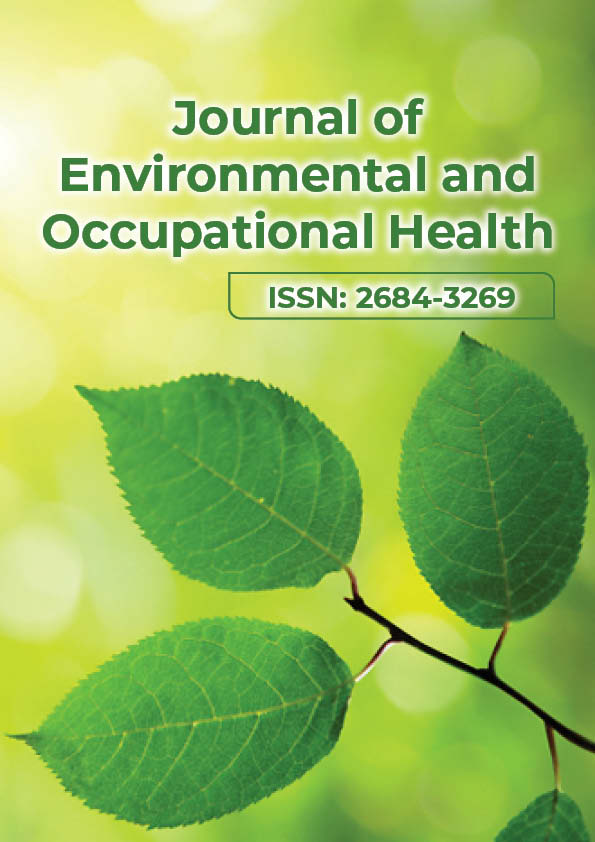Opinion Article - Journal of Environmental and Occupational Health (2023)
The Role of Occupational Medicine in Preventing Work-related Injuries
Chang Chen*Chang Chen, Department of Environmental Sciences, Fudan University, Shanghai, China, Email: breden1@gmail.com
Received: 29-May-2023, Manuscript No. JENVOH-23-104528; Editor assigned: 01-Jun-2023, Pre QC No. JENVOH-23-104528 (PQ); Reviewed: 16-Jun-2023, QC No. JENVOH-23-104528; Revised: 23-Jun-2023, Manuscript No. JENVOH-23-104528 (R); Published: 30-Jun-2023
Description
Occupational medicine, also known as occupational health, is a branch of medicine that focuses on the health and well-being of individuals in relation to their work environment. It encompasses a wide range of medical disciplines, including preventive medicine, epidemiology, toxicology, and rehabilitation medicine, among others. Occupational medicine plays a crucial role in ensuring the safety, health, and productivity of workers across various industries. One of the key objectives of occupational medicine is the prevention and management of work-related injuries and illnesses.
Occupational health professionals strive to identify and control workplace hazards that can lead to accidents, injuries, or the development of occupational diseases. They conduct risk assessments, implement preventive measures, and educate workers and employers on safety practices to reduce the occurrence of work-related health issues. Occupational medicine involves the assessment and management of both physical and mental health conditions that can arise from work-related factors.
Physical hazards in the workplace can include exposure to harmful substances, noise, vibration, radiation, and ergonomic risks. Occupational health physicians and specialists evaluate the impact of these hazards on workers’ health, provide advice on appropriate protective measures, and offer treatment and rehabilitation services when necessary. Furthermore, occupational medicine addresses the psychological and psychosocial aspects of work that can affect employee well-being. Work-related stress, burnout, and mental health conditions are increasingly recognized as significant factors impacting workers’ health and productivity. Occupational health professionals assist in identifying and managing these issues by promoting a healthy work-life balance, providing psychological support, and implementing strategies to reduce workplace stressors. In addition to prevention and management, occupational medicine emphasizes the importance of workplace health promotion. Promoting healthy lifestyles, encouraging physical activity, and providing guidance on nutrition and wellness are integral components of occupational health programs. These initiatives not only enhance the overall health and quality of life of workers but also contribute to increased productivity and reduced healthcare costs for employers.
Another crucial aspect of occupational medicine is occupational rehabilitation. When an employee sustains a work-related injury or illness, rehabilitation aims to facilitate their recovery and successful return to work. Occupational health specialists collaborate with healthcare professionals, employers, and insurers to develop customized rehabilitation plans that address the individual’s medical needs, functional capabilities, and work requirements. These plans may involve physical therapy, vocational training, ergonomic modifications, and psychological support to enable a smooth transition back to work.
Occupational medicine also plays a pivotal role in ensuring compliance with occupational health and safety regulations. Occupational health professionals advise employers on legal requirements, conduct workplace inspections, and provide guidance on implementing safety policies and procedures. By promoting a culture of safety and adherence to regulations, occupational medicine helps reduce the incidence of workplace accidents and injuries, safeguarding both employees and employers. Research and education are fundamental components of occupational medicine. Through ongoing research, occupational health professionals contribute to the understanding of occupational diseases, risk factors, and preventive measures.
They also provide training and education programs for workers and employers, raising awareness about potential health hazards and promoting a culture of health and safety in the workplace.
In conclusion, occupational medicine is a specialized field that focuses on the health and well-being of individuals in relation to their work environment. By addressing the prevention, management, and rehabilitation of work-related injuries and illnesses, occupational health professionals play a vital role in safeguarding the health and productivity of workers across various industries.
Through their expertise in risk assessment, health promotion, and regulatory compliance, they contribute to creating safe and healthy workplaces for employees, while also benefiting employers by reducing healthcare costs and improving productivity.
Copyright: © 2023 The Authors. This is an open access article under the terms of the Creative Commons Attribution Non Commercial Share Alike 4.0 (https://creativecommons.org/licenses/by-nc-sa/4.0/). This is an open access article distributed under the terms of the Creative Commons Attribution License, which permits unrestricted use, distribution, and reproduction in any medium, provided the original work is properly cited.





